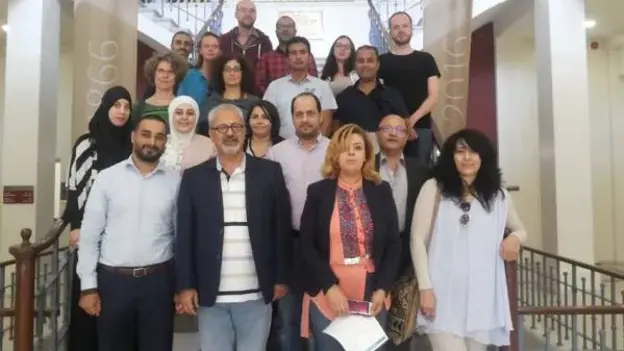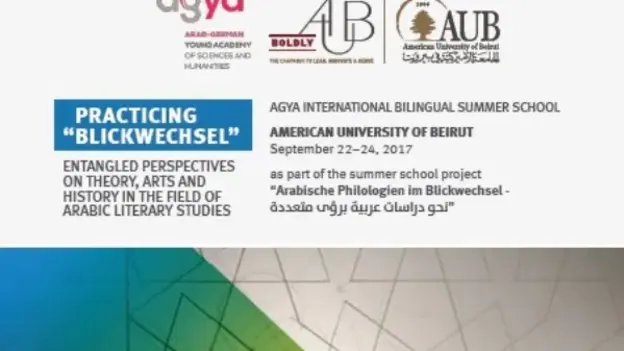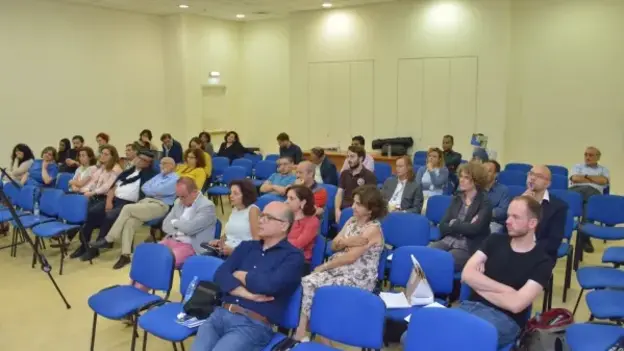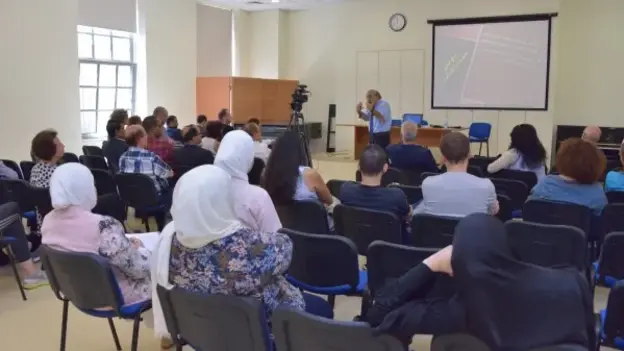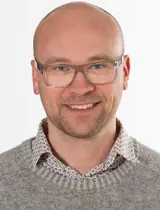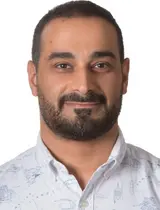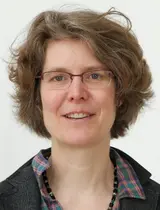Tandem Project
AGYA International Bilingual Summer School Practicing ‘Blickwechsel’: Entangled Perspectives on Theory, Arts and History in the Field of Arabic Literary Studies
Academic cooperation between scholars of Arabic literature based in Germany and the Arab world has increased in recent years. However, they still mostly act in separate spheres, due to epistemic, linguistic and practical reasons. To what extent do the research questions and methods used by scholars based in the Arab world differ from those used by their colleagues in other countries? How can we enhance sustainable academic exchange between scholars and institutions? AGYA members Bilal Orfali (American University of Beirut), Barbara Winckler (University of Münster) and Christian Junge (University of Marburg), organized a summer school which brought together scholars of Arabic literature and culture from Arab and European universities to discuss these issues and explore further cooperation.
The AGYA summer school '‘Practicing ‘Blickwechsel’: Entangled Perspectives on Theory, Arts and History in the Field of Arabic Literary Studies' which took place in September 2017 at the American University of Beirut, is part of the international summer school program 'Arabische Philologien im Blickwechsel –نحو دراسات عربية برؤى متعددة ' (www.arabic-philologies.de). The program has a twofold agenda. It aims to facilitate the systematic exchange of perspectives and experiences between scholars based in the West (Germany in particular) and in the Arab world and to foster the use of Arabic as an academic language. Addressing young scholars (PhD students, postdocs) in the field of Arabic literary studies based in Germany and other European countries and the Arab world, it provides them the opportunity to present their own research in an international academic context, to discuss current, innovative approaches to Arabic philology, literature and culture, and to practice the respective foreign language (English or Arabic).
‘Blickwechsel’: A Key Concept for (Ex-)Change
The German metaphor 'Blickwechsel', as elaborated by Hans Belting (2008), is a crucial concept of cultural and academic exchange. It comprises a twofold dimension, i.e. the exchange of academic knowledge and the change of one’s own academic perspective. Such an 'entangled perspective' invites to collaborative knowledge production and academic self-reflection. In accordance to this approach, the thematic focus of the summer school 2017 in Beirut was laid on entanglements, as expressed by the concept 'Blickwechsel'. In recent years, a wide range of academic disciplines have tried thoroughly to overcome culturalist, nationalist and hegemonic perspectives and to focus instead on transfer, collaboration and entanglements in history, culture and arts. Paradigmatic approaches range from Edward Said’s 'contrapuntal reading' of novels from the British empire in order to unveil the neglected colonial other and accentuate implications of colonialism (1993) to Shmuel Eisenstadt’s concept of 'multiple modernities' refuting homogenizing and hegemonizing conceptualization of European and Western modernity (2002) to Belting’s 'Blickwechsel' which uncovers a historical encounter between Abbasid Baghdad and Renaissance Florence and its lasting effect on Western visual culture (2008). The concept of 'entangled history', in addition, emphasizes the importance of circulation, exchange, and flow of knowledge between communities, nations, and empires.
Practicing ‘Blickwechsel’: Scholars exchange perspectives and experiences
How can approaches exploring historical entanglements be translated to the fields of Literature, Art and Cultural Studies? What is gained when we, moving beyond strict national and cultural boundaries, focus our attention on exchange and transfer? Where are the limits of entangled history and what roles do untranslatability, foreignness and forgetting play? These and related questions stimulated a fruitful, bilingual debate among ten junior scholars and four senior scholars from Egypt, Germany, Italy, Lebanon, Morocco, Saudi Arabia, and Sweden. In two plenary debate sessions, the participants discussed, in English, Hans Belting’s work Florence and Baghdad: Renaissance Art and Arab Science and, in Arabic, Abdelfattah Kilito’s Thou Shalt Not Speak My Language. The plenary discussions were also designed to instigate a discussion both in Arabic and English on equal footing.
Methodological issues were at the core of the project discussion sessions, in which the ten PhD students and postdocs had the chance to present their research projects and discuss them at length with senior scholars. The debates also revolved around the problem of how to find common ground, in view of the fact that theoretical and methodological approaches used at Arab and European universities often differ significantly from each other. The junior scholars presented their research in the academic language they are less well-versed in. This approach aims to promote the use of Arabic as an active academic language at European universities and vice versa, English as an active academic language at Arab universities.
Making Academic Arabic More Visible: The Keynotes
The two keynotes of the AGYA summer school promoted, in different ways, the advantages of practicing 'Blickwechsel' and using Arabic as a modern academic language. Charbel Dagher, Professor at the University of Balamand, Lebanon, presented a keynote on 'The ‘Visuality’ of the Modern Arabic Poem' (in Arabic) that practiced a 'Blickwechsel' between literature and art.
Mahmoud al-Batal, Professor at the American University of Beirut, gave a programmatic lecture titled 'Towards an Arab Spring in Language: Teaching Arabic and Learning Arabic between the Challenges of Reality and the Horizons of the Future' (in Arabic), in which he highlighted the necessity of tackling the challenges brought by diglossia in the Arab world.
Outlook: Thou Shalt Speak My Language!
Drawing from intense discussions and lived experience, the AGYA summer school gave rich impulses for academic 'Blickwechsel' and encouraged scholars to speak English and Arabic on equal footing. This helps overcome the existing epistemic and linguistic devides between research practices at Arab and European universities and make the existing plurality of knowledge production in Arabic Studies visible and fruitful. It thus facilitates the creation of transcultural academic teaching and learning communities that produce knowledge in a dialogue between equals.
A cooperation with American University of Beirut (AUB) and Westfälische Wilhelms-Universität Münster
- Venue
- American University of Beirut (AUB), Lebanon
- Year
- 2017
- Funding Scheme
- Tandem Project
- Countries Involved
- Germany, Lebanon
